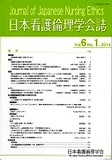Japanese
English
- 販売していません
- Abstract 文献概要
- 参考文献 Reference
- サイト内被引用 Cited by
看護師が幸せになれないのは何故でしょうか?
誰もが幸せを求める権利を持っています。しかし、看護師は幸せという言葉は自分たちには無関係なものだと思っています。それはなぜでしょう? 第一の理由として、幸福の概念に対する誤解が挙げられます。幸福とは一般的に「楽しいまたは嬉しい」状態だと考えられています。看護師は病気や障害を持つ患者たちのケアをしています。従って、患者のケアに当たる際に自分が幸せであることに罪悪感を持つ可能性があります。しかし、幸せの概念は単純なものではありません。幸福のレベルあるいは種類を分類している学者がいます。伝統的な東洋の学者は、精神的な幸福は肉体的な幸福よりも重要であると考えています1。ネトル2は古代と現代の学者の研究を通して、幸福の意味を以下のように3つのレベルに分類しています。それらは、レベル1:一時的な感情(楽しみ、身体的快感)、レベル2:感情に対する判断(幸福感、満足感)、レベル3:生活の質(成功、可能性の実現)です。確かに患者のケアにあたっている看護師がレベル1の幸せを求めるのはおかしなことに思えますが、レベル2または3の幸せ(自分の内面の満足感あるいは自己実現)を追求することは可能です。
第二の理由として挙げられるのは、看護の文化に存在する完全主義です。看護師のいかなるミスも患者の生命と健康に重大な悪影響を与える可能性があるため、看護師は自分の行動すべてが完璧でなくてはならないと考えています。先輩の看護師はたとえそれが患者の状態とは関係のない場合でも、新人看護師の小さなミスを叱責する傾向があります。この傾向は看護師の自信に悪影響を与え、しばしば高い離職率を生みだしています。ベン・シャハー3は正の完全主義と負の完全主義を区別し、負の完全主義を単純に「完全主義」と呼び、正の完全主義を「楽観主義」と呼んでいます。看護師が楽観主義者になろうと努力すれば、現実をそのまま受け止め、自分の努力や他の看護師による不適切な結果も評価することができ、欠点を探す人から長所を探す人になることができるでしょう。
Why can't nurses be happy?
Everyone has the right to seek happiness. However, nurses donA't think that the term of happiness is related to them. Why? The first reason is misunderstanding of the concept of happiness. Generally, happiness is considered as ‘joyful or pleasant’ conditions. Nurses care for patients who suffer from diseases or disability. So nurses may feel guilty if they are happy while caring for patients. However, the concept of happiness is not simple. Some scholars classified levels or kinds of happiness. Traditional Eastern scholars consider mental happiness more important than physical.1 Nettle2 identified three meanings of happiness from ancient and modern scholars’ works: Level 1 momentary feeling (joy, physical pleasure); Level 2 judgment about feelings(well being, satisfaction); and Level 3 quality of life(flourishing, fulfilling potential). Admittedly, it seems strange for nurses to seek Level one happiness during their care of patients, but they can however pursue level two or three(internal satisfaction or self-actualization).
The second reason is the perfectionism found in the nursing culture. Nurses think all their actions should be perfect because any nursing error could negatively impact patient's life and health. Senior nurses tend to scold new nurses' small mistakes, even if it is irrelevant to a patient's condition. This has a negative effect on nurses' confidence and often leads to high dropout rate. Ben-Shahar3 differentiated positive perfectionism from negative. He referred to negative perfectionism simply as perfectionism, and positive perfectionism as optimalism. If nurses try to be optimalists, they could accept reality as it is, appreciate their effort and other nurses' irrelevant outcome, and be benefit finders from fault finders.
Copyright © 2014, The Japan Nursing Ethics Associatin. All rights reserved.


